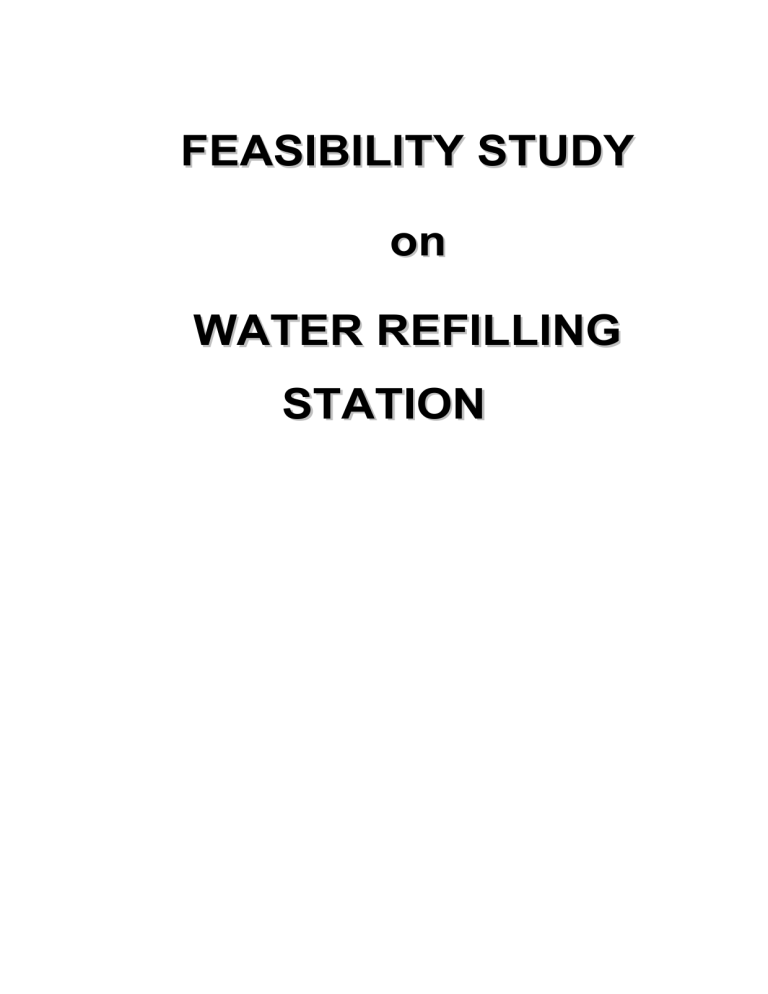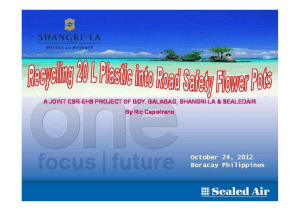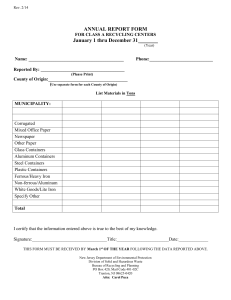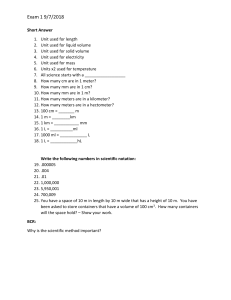
FEASIBILITY STUDY on WATER REFILLING STATION INTRODUCTION The demand at the water refilling stations – water stores that sell purified water – is now increasing. The quality of purified water conforms to the national standards for drinking water and is even better than the quality of water produced by traditional water supply systems in terms of removed impurities. Over the years, as the demand for cleaner water becomes higher, the price of household water purifiers and bottled water has become prohibitive. Water refilling stations managed by private entrepreneurs offer a cheaper and more convenient solution to the public’s drinking water needs than bottled water or the use of household filters. At present, about 20 water refilling stations have proliferated in Nasugbu, Batangas. They sell purified water of comparable quality with bottled water at a lower price. For example, the current price per gallon of refilled purified water in Nasugbu ranges from P 20 to P 30 per 5-gallon container. In Nasugbu, most of the water refilling stations is connected to the pipes of Nasugbu Water District for their source of raw water while in other areas they opt to use private deep wells. The “potable water” supplied by the providers is then further purified by utilizing a combination of water treatment equipment, such as sediment filters, carbon filters, water softeners, reverse osmosis membranes, ultra-violet lamps, and ozone generators. Typical water refilling stations can produce 3,000 to 12,000 liters of purified water per day. In previous years, most of the people were bringing a container to a water refilling station to buy purified water. Nowadays, because of convenience on the part of the consumers, purified water in 5gallon (22.7 liters) containers is delivered by the station directly to the people’s home. Proponent: CADP CONSUMERS COOPERATIVE Proposed Location: Brgy. Lumbangan, Nasugbu, Batangas Objectives: A. Provide a potable drinking water for the community. B. Increase the income of the cooperative as it helps the community. Nature of the Business CADP Consumer Cooperative is an organization established by the employees of Central Azucarera Don Pedro, Inc. (CADPI). Its purpose, just like any other cooperative is to serve the members and provide them their immediate needs and help the members attain economic stability. Thus, the cooperative operates a consumer store to provide the members their basic needs at affordable prices. The water refilling station; “Aqua Kabayan” as it would be named is going to provide additional services and benefits to the members as well as other residents in the community (Barangay Lumbangan). Potable water will be more accessible as it will be located at the center of Barangay Lumbangan (besides the Consumer Store) where almost all of the employees pass by on their home. “Aqua Kabayan” will also offer additional services like free delivery and the product can also be availed on credit (for members only). MARKETING ASPECT Target Market • Members of the cooperative • Local Residents Demand The CADP Consumer Cooperative has a total membership of 523, working on three shifts a day and there are an estimated 100 families residing nearby the store who are neither members nor employee of CADPI. On the average, a family of four members consumes three 5-gallon purified water every week or 12 containers a month. Using this data the projected demand for water refilling station in the specified area is: Target Market Population Estimated Weekly Consumption (in 5 gallon containers) Cooperative members 523 1,569 6,276 Local Residents 100 300 1,200 623 1,869 7,476 9,345 37,380 TOTAL Demand in Gallons Estimated Monthly Consumption (in 5 gallon containers) Table 1 Demand Chart Market Share It is assumed that since the targeted market is members of the organization, 80% of the member will opt to buy from “Aqua Kabayan” (members buying in the cooperative earns dividends and refunds at the end of the year). While considering the accessibility factor, 80% of the local residents are also going to consider getting their purified water supply from the store. Target Market Estimated Weekly Consumption (in 5 gallon containers) Cooperative members 1,569 1,255 6,276 5,020 Local Residents 300 240 1,200 960 1,869 1,495 7,476 9,345 7,475 37,380 TOTAL in Gallons Market Share Estimated Monthly Consumption (in 5 gallon containers) Market Share 5,980 29,900 Table 2 Market Share Proposed Marketing Strategy Product Strategy – Refilling Station will be constructed with transparent glass and according to prescribed standards so that the customers will be able to see how carefully and cleanly the products are being processed. Excellent quality will be maintained by giving the workers training and guidance on good manufacturing practices. Distribution Strategy – A delivery vehicle will be purchased to shorten waiting time of customers. Customers can order thru phone call or text and 20 minutes waiting time will be observed. It will also be assured that products will be handled properly and will maintain its quality during delivery. Promotion Strategy – Information dissemination will be done so that target market will be aware of the existence of the water refilling station. Members will be informed of the benefits and importance of drinking clean water and the added benefits of buying it from the cooperative Pricing Strategy – Being a new entrant, “Aqua Kabayan” will offer an affordable price of 25.00 per container. SALES PROJECTIONS YEAR 1 YEAR 2 71,76 YEAR 3 78,93 in units of 5 gal containers 0 Selling Price 25 25 25 1,794,000.0 1,973,400.0 2,170,725.0 0 0 0 Total Sales Table 3 Three Year Sales Projection 6 86,82 9 MARKETING BUDGET Delivery Vehicle There is a need to purchase a delivery vehicle to ensure the fast and timely delivery of products. Consumers prefer to buy products that are readily available and with minimal waiting time. Water is a basic need and there should be no delays in the delivery. Estimated cost of a delivery vehicle is at Php 75,000.00. Estimated Useful Life is five (5) years. Fuel Consumption in the delivery of goods is estimated at 500.00 per day. Information Dissemination The awareness campaign will entail costs of printing flyers (for distribution) and tarpaulins (to be placed at strategic locations). Cost of these materials is estimated at Php 10,000.00. Packaging and Labeling Initially, 100 units of containers (5 gal) will be purchased. Since most of the consumers already have containers, the said containers will be replaced every delivery. Empty containers will be refilled and delivered to other customers so that consumers will only have to pay for the contents and not the containers. All containers should have labels, bearing the name of Aqua Kabayan and all containers should all be sealed to ensure that the product reaches the end consumer with utmost quality. Fifteen thousand pieces of labels and seals will be printed on a quarterly basis. Estimated cost is Php 3.00 per container. Manpower There will be 2 persons handling the delivery, both of which should know how to drive the delivery vehicle so that they can work alternately on the tasks to be assigned to them. They are going to receive salaries of Php 4,500 a month or Php 150.00 daily. Account Title Amount in Pesos Delivery Vehicle 75,000.00 Fuel and Lubricants 15,000.00 Promotions 10,000.00 Packaging (containers) 15,000.00 Materials and Supplies (stickers) and 45,000.00 seals (quarterly) Salaries and Wages 9,000.00 TOTAL 169,000.00 Table 4 Marketing Budget MARKETING EXPENSES Account Title Delivery Vehicle Depreciation) YEAR 1 ( Amount of YEAR 2 15,000.0 0 15,000.0 0 180,000.0 Fuel & Lubricants 0 0 Packaging (containers) 0 198,000.0 0 5,000.0 180,000.0 0 TOTAL 0 0 217,800.0 0 118,800.0 0 498,000.0 Table 5 Marketing Expenses (three years) 5,000.0 0 198,000.0 108,000.0 Salaries and Wages 10,000.0 0 0 0 217,800.0 0 10,000.0 5,000.0 Materials and Supplies (stickers) and seals (quarterly) 15,000.0 0 0 10,000.0 Promotions YEAR 3 130,680.0 0 544,800.0 0 596,280.0 0 PRODUCTION ASPECT Production Process (water filtration & purification system) 1st unit Stage 1 Stage 2 Stage 3 Stage 4 2nd unit Stage 5 Stage 6 Stage 7 3rd unit Stage 8 Stage 9 Stage 10 Multimedia sediment process The water first passes through the 1st stage which makes up of a course gravel that traps solid particles of about 100 micron Consists of sand filters that removes sediment of 50 micron ratings Consists of fine sand that eliminates solid particles of 25 micron Consists of fine clear slit that eliminates solid particles down to 5 micron Multi media carbon process Makes use of a lignite carbon that removes foul taste and odor Makes use of bituminous carbon that eliminates yellowish and brownish discoloration brought by inorganic contaminants Makes use of granular activated carbon (GAC) as the last multi media carbon stage. This stage is where the water undergoes longer contact time with the carbon to eliminate other contaminants that might cause foul smell or taste Water conditioning and softening process Makes use of resin beads that attract mineral contents that convert hard water to soft water Makes use of ion exchange beads to condition water by extracting the organic and inorganic chemicals present in the water Makes use of another carbon that eliminates any ferrous iron (dissolved iron) in water Stage 11 4th unit Stage 12 5th unit Stage 13 6th unit Stage 14 7th unit Stage 15 8th unit Stage 16 Makes use of fine gravel that serves as a sieve which eliminates any residue that might come out during regeneration time. This is a cleansing agent. Ultra micron process Consists of a one (1) big blue housing that includes 1 micron cartridge that eliminates any microscopic residue that might go to the reverse osmosis membrane. This stage stands as a protection for the membrane against premature clogging Reverse osmosis It is the most important system in any water filtration and purification process. This makes use of reverse osmosis equipment which has semi-permeable membrane that only allows pure water to pass through and pushes the unpure water out of the system to the reverse side or the reject drain line. Polishing process Includes one (1) big blue housing that consists of a carbon cartridge that serves as a polishing stage to make the water crystal clear and shiny Anti-microbial process This stage eliminates cyst micro organism that has a micron rating of 1 and has a very thick cell wall where UV light sometimes cannot penetrate; however a micron rating of 0.5 will eliminate such kind of micro organisms. Cyst causes diarrhea and gastro enteritis. Water sterilization process This last and final stage is the second most important system in a water filtration and purification system. This is the stage that kills all microorganisms and other diseases causing bacteria from infiltrating into the product water, thereby assuring safe and pure water. Table 5 Production Process Fixed Assets Required: Item Amount Useful Life in Years Annual Depreciation Land 50,000.00 Machineries & Equipment 300,000.00 15 20,000.00 Building (25 sq meters) 150,000.00 20 7,500.00 TOTAL 500,000.00 ***Repairs and maintenance of equipment is assumed at 2.00 per month. Table 6 Schedule of fixed Assets Required FACTORY LOCATION AND LAY OUT 27,500.00 COST OF LABOR There will be 2 workers tasked in refilling and cleaning of containers. The cooperative manager will be the one to oversee the production and help in the operation whenever it is needed. The two workers will be receiving Php 4,500 a month. MATERIALS AND SUPPLIES Materials and Supplies are estimated at Php 6,000.00 monthly (water is the major raw materials needed). FACTORY OVERHEAD Overhead expenses are composed of Utilities, Telephone Bills and Depreciation. Electric consumption is assumed at Php 7,500.00 monthly and telephone bills are at Php 1,000.00 per month. Please refer to Depreciation table for depreciation expenses. PRODUCTION COST Account Title YEAR 1 108,000.0 Direct Labor 0 Materials & Supplies 0 YEAR 2 118,800.0 0 72,000.0 0 79,200.0 0 0 Depreciation (Machineries & Equipment 0 Utilities 0 7,500.0 0 20,000.0 0 0 20,000.0 0 112,200.0 0 309,500.0 0 7,500.0 20,000.0 102,000.0 TOTAL 87,120.0 0 7,500.0 Depreciation (Building) YEAR 3 130,680.0 123,420.0 0 337,700.0 0 368,720.0 0 Table 7 Production Cost (three years) PRODUCTION COST PER UNIT YEAR 1 309,500.0 TOTAL PRODUCTION COST 0 MARKETING EXPENSES 0 Units Produced 0 PC PER UNIT 5 YEAR 2 337,700.0 0 498,000.0 YEAR 3 368,720.0 0 544,800.0 0 71,76 596,280.0 0 78,93 6 11.2 86,82 9 11.1 8 11.1 1 Table 8 Production Cost per unit (three years) ORGANIZATION AND MANAGEMENT ASPECT 1. Form of Business Multi-Purpose Cooperative 2. Business name CADP Multi-Purpose Cooperative under the brand name: “Aqua Kabayan” 3. Organizational Chart Board of Directors Coop. Manager Worker 1 4. Worker 2 Worker 3 Worker 4 Key Personnel and Responsibilities Cooperative Manager – In charge of the overall operation of the business. Acts as the marketing officer and represents the business in all external concerns. The manager will oversee the entire operation of the business and collects cash sales for remittance to the cooperative treasurer. Worker 1 & Worker 2 – will handle the plant operation. They will be in charge of cleaning and refilling containers. They will also observe proper sanitation of the plant and maintain excellent quality of the product. Worker 3 and Worker 4 – will be tasked in the delivery and distribution of the products. They will ensure that all deliveries are done at the shortest possible time. They will also handle collection of payments and issuance of receipts during delivery. FINANCIAL ASPECT TOTAL CAPITAL REQUIREMENTS Account Title Amount Fixed Assets: Land 50,000.00 Machineries & Equipment 300,000.00 Building (25 sq meters) 150,000.00 Delivery Vehicle 75,000.00 Total Fixed Assets Required 575,000.00 Workling Capital: Salaries & Wages 54,000.00 Returnable Containers 15,000.00 Materials & Supplies 45,000.00 Fuel, Gas & Lubricants 45,000.00 Promotions 10,000.00 Raw Material Supply (Water) 18,000.00 Utilities 25,500.00 Total Working Capital (first 3 months of operation) 212,500.00 TOTAL CAPITAL REQUIREMENTS 787,500.00 Table 9 Total Capital Requirements INCOME STATEMENT Year 1 1,794,000.0 Sales 0 Year 2 1,973,400.0 0 Year 3 2,170,725.0 0 Less: Cost of Sales 108,000. Direct Labor 00 118,800. 00 00 72,000. Materials & Supplies 00 Factory Overhead Expenses Depreciation Expense (Building) 79,200. 00 7,500. 00 00 20,000. 00 00 112,200. 00 00 139,700. 00 00 337,700. 00 1,484,500.0 Gross Profit on Sales 0 150,920. 00 309,500. Cost of Goods Available for Sale 123,420. 00 129,500. Total FOE 20,000. 00 102,000. Utilities 7,500. 00 20,000. Depreciation Expense (M & E) 87,120. 00 7,500. 00 130,680. 368,720. 00 1,635,700.0 0 1,802,005.0 0 Less: Operating Expenses Marketing Expenses 180,000. Fuel, Gas & Lubricants 00 198,000. 00 00 10,000. Promotions 00 10,000. 00 00 5,000. 00 00 198,000. 00 118,800. 00 15,000. 00 00 00 00 00 15,000. 544,800. 986,500. Net Operating Profit 130,680. 00 15,000. 498,000. Total Marketing Expenses 217,800. 00 108,000. Salaries & Wages 00 Depreciation Expense Delivery Vehicle 00 5,000. 00 180,000. Materials & supplies 10,000. 00 5,000. Packaging (containers) 217,800. 596,280. 00 1,090,900.0 0 1,205,725.0 0 Table 10 Income Statement CASH FLOW STATEMENT Cash Inflows Initial Capital Year 1 787,500.0 0 Year 2 Year 3 Sales Total Cash Inflows 1,794,000.0 0 2,581,500.0 0 1,973,400.0 0 1,973,400.0 0 2,170,725.0 0 2,170,725.0 0 198,000.0 0 198,000.0 0 237,600.0 0 10,000.0 0 79,200.0 0 112,200.0 0 835,000.0 0 1,138,400.0 0 1,231,500.0 0 2,369,900.0 0 217,800.0 0 217,800.0 0 261,360.0 0 10,000.0 0 87,120.0 0 123,420.0 0 917,500.0 0 1,253,225.0 0 2,369,900.0 0 3,623,125.0 0 Cash Outflows Purchase Land Purchase & Installation of Machineries & Equipment Construction of Building Purchase of Delivery Vehicle Purchase Returnable Containers Purchase of Labels & Stickers Fuel, Gas & Lubricants Payment of Salaries & Wages Promotions Expense Payment of Raw Material Supply Payment of Utilities Total Cash Outflows Net Cash Inflows 50,000.0 0 300,000.0 0 150,000.0 0 75,000.0 0 15,000.0 0 180,000.0 0 180,000.0 0 216,000.0 0 10,000.0 0 72,000.0 0 102,000.0 0 1,350,000.0 0 1,231,500.0 0 Add: Cash Balance Beg. Cash Balance, end 1,231,500.0 0 Table 11 Cash Flow Statement BALANCE SHEET Year 1 Assets Year 2 Year 3 Cash 1,231,500.00 2,369,900.00 3,623,125.00 50,000.00 50,000.00 50,000.00 Building 142,500.00 135,000.00 127,500.00 Machineries & Equipment 280,000.00 260,000.00 240,000.00 Delivery Vehicle 60,000.00 45,000.00 30,000.00 Returnable Containers 10,000.00 5,000.00 - 1,774,000.00 2,864,900.00 4,070,625.00 787,500.00 1,774,000.00 2,864,900.00 986,500.00 1,090,900.00 1,205,725.00 1,774,000.00 2,864,900.00 4,070,625.00 Land Total Assets Liabilities & Capital Coop Investments Add: Net Income from Operation Total Liabilities & Capital Table 12 Balance Sheet FINANCIAL RATIO NALYSIS PROFITABILITY RATIOS Return on Assets (ROA) 1) Net Income 2) = = 986,500.0 0 1,774,000.0 0 = = 986,500.0 0 1,794,000.0 0 = Total Assets Return on Equity (ROE) Net Income 3) = 986,500.0 0 1,774,000.0 0 Owner's Equity Net Profit Margin Net Income Sales Table 13 Financial Ratio Analysis 0.5 6 0.5 6 0.5 5


